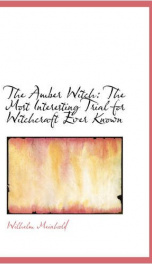from the INTRODUCTION: The origin of our biographer cannot be traced with any degree of certainty, owing to the loss of the first part of his manuscript. It is, however, pretty clear that he was not a Pomeranian, as he says he was in Silesia in his youth, and mentions relations scattered far and wide, not only at Hamburg and Cologne, but even at Antwerp; above all, his south German language betrays a foreign origin, and he makes use of words which are, I believe, peculiar to Swabia. He must, however, have been living for a long time in Pomerania at the time he wrote, as he even more frequently uses Low-German expressions, such as occur in contemporary native Pomeranian writers. Since he sprang from an ancient noble family, as he says on several occasions, it is possible that some particulars relating to the Schweidlers might be discovered in the family records of the seventeenth century which would give a clew to his native country; but I have sought for that name in all the sources of information accessible to me, in vain, and am led to suspect that our author, like many of his contemporaries, laid aside his nobility and changed his name when he took holy orders. I will not, however, venture on any further conjectures; the manuscript, of which six chapters are missing, begins with the words "Imperialists plundered," and evidently the previous pages must have contained an account of the breaking out of the Thirty Years' War in the island of Usedom. It goes on as follows:-- "Coffers, chests, and closets were all plundered and broken to pieces, and my surplice also was torn, so that I remained in great distress and tribulation. But my poor little daughter they did not find, seeing that I had hidden her in the stable, which was dark, without which I doubt not they would have made my heart heavy indeed. The lewd dogs would even have been rude to my old maid Ilse, a woman hard upon fifty, if an old cornet had not forbidden them. Wherefore I gave thanks to my Maker when the wild guests were gone, that I had first saved my child from their clutches, although not one dust of flour, nor one grain of corn, one morsel of meat even of a finger's length was left, and I knew not how I should any longer support my own life, and my poor child's. Item, I thanked God that I had likewise secured the vasa sacra, which I had forthwith buried in the church in front of the altar, in presence of the two churchwardens, Hinrich Seden and Claus Bulken, of Uekeritze, commending them to the care of God. And now because, as I have already said, I was suffering the pangs of hunger, I wrote to his lordship the Sheriff Wittich V. Appelmann, at Pudgla, that for the love of God and his holy Gospel he should send me that which his highness' grace Philippus Julius had allowed me as praestanda from the convent at Pudgla, to wit, thirty bushels of barley and twenty-five marks of silver, which, howbeit his lordship had always withheld from me hitherto (for he was a very hard inhuman man, as he despised the holy Gospel and the preaching of the Word, and openly, without shame, reviled the servants of God, saying that they were useless feeders, and that Luther had but half cleansed the pigstye of the Church--God mend it!). But he answered me nothing, and I should have perished for want if Hinrich Seden had not begged for me in the parish. May God reward the honest fellow for it in eternity! Moreover, he was then growing old, and was sorely plagued by his wicked wife Lizzie Kolken. Methought when I married them that it would not turn out over well, seeing that she was in common report of having long lived in unchastity with Wittich Appelmann, who had ever been an arch-rogue, and especially an arrant whoremaster, and such the Lord never blesses. --This text refers to the Kindle Edition edition.




